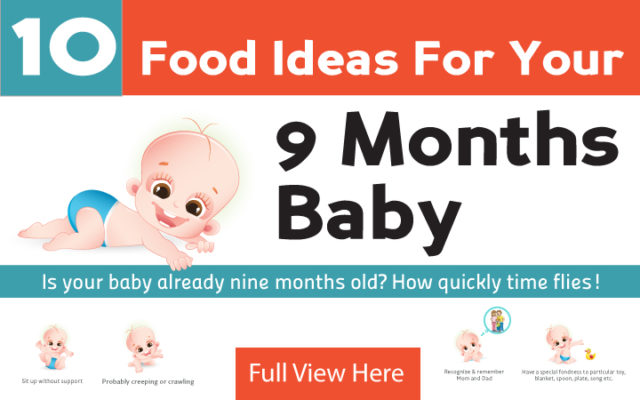Introducing solid foods to your 6 – 12 month old baby
If your baby is 6-8 month old and if he or she is just starting solids at this stage,you will have to start slowly,and remember to prepare a very small amount of food to start with and baby’s milk continues to be more important than solids at this age. If your baby is 10-12 months old, baby might has found a few foods that are truly favorite foods.But at this stage, chunkier “table foods” are a big part of his meals and he may not like those thinner purees anymore.and also she or he may start begin to refuse to eat but but it is still unlikely that she is a Picky Eater.if at all. Your infant’s refusal to eat even most loved foods might be ascribed to numerous things. She may essentially be excessively caught up with, making it impossible to quit investigating her reality and she may get very miffed when you place her in her infant chair to eat. With her freedom developing, she may likewise start to indicate preferences for specific foods and Refuse to be Spoon Fed.
IMPORTANT
- Try not to give honey until after a child’s first birthday celebration. Because honey may contain certain spores that, while harmless to grown-ups, can cause botulism in babies.
- Try not to give general cow’s milk until the point when your child is more grown than a year since it doesn’t have the nutrition that newborn children require.
What to Eat at 6 to 8 Months of Age?
CEREALS
Try mixing together the grains that your baby has had without any reaction(s) – Brown Rice and Oatmeal with Pear Sauce for example.
FRUITS
Start making your own fruit combinations once baby has had several fruits without any reaction(s). After 8 months old – you may wish to try offering raw ripe fruits. Soft cooked fruits make for great beginner Baby Finger Foods; Learn about Introducing Baby Finger Foods.
VEGETABLES
Veggie combinations are great to offer now. Ensure that all veggies have been previously offered without any reaction(s) prior to mixing & matching. After 8 months old – you may wish to try offering soft cooked veggies in dices or tiny chunks and bits. Soft cooked veggies make for great beginner Baby Finger Foods.
PROTEIN
Once your baby has reached 8 months old, try offering tofu finger cubes dusted with Cheerio “dust” or other cereal “dust”. Many pediatricians are now recommending Meats as first foods due to the Iron content – ask your pediatrician.
DAIRY
Around 8 months old, you should be able to offer plain whole milk yogurt and mild cheeses to your baby. Many pediatricians even suggest yogurt as a great first food as early as 6 months of age. Mix some yogurt with a favorite fruit puree for a breakfast offering. Visit our Offering Your Baby Yogurt page for more information on introducing Yogurt and Cheese.
What to Eat at 10 to 12 Months of Age?
Pasta, veggies, and fruit should all be soft cooked and possibly mashed with a fork or masher. (Bananas need only be mashed.)
Meats and proteins such as egg yolk, should be cooked and pureed or chopped into small soft bits. If offering Tofu, you need not cook it first.
CEREALS
All grains and pastas! Create your own baby pasta salad with favorite veggies and cheeses.
FRUITS
Start making your own fruit combinations once baby has had several fruits without any reaction(s). Go slowly if introducing citrus fruits now and watch for possible reactions to the acidity.
VEGETABLES
Soft cooked veggies make for great beginner Baby Finger Foods. Try mixing up a soft cooked and diced veggie medley now. Slowly introduce tomato and other acidic foods; watch for reactions to the acidity.
MEATS & PROTEIN
Between 10-12 months old you should be able to introduce white-fleshed fish (if you have not already done so) and other types of fish. Bake fish plain or breaded and offer with steamed veggies for a healthy meal. Salmon makes a great meal for your baby!
DAIRY
By 12 months old, baby may be weaning from breast milk or formula to whole milk. Help ease the change by offering ½ breast milk and ½ milk or ½ milk and ½ formula mixed during the first few days of the transition.And also breast-fed babies may also be weaning now but remember, there is no reason to wean your breastfed baby until your baby is ready.
Feeding your baby safely
- Never leave your child unattended while eating on the off chance that he or she chokes. Try not to serve foods that could display a choking risk, for example, entire grapes, raw vegetables, hard natural products, raisins, white bread, bits of hard cheese, sausage, popcorn, and hard candies.
- Check , Does it melt in the mouth? Some dry cereals will soften in the mouth, thus will light and flaky crackers.
- Make sure,it is sufficiently cooked, so it crushes effectively finely cooked vegetables and fruits will mash effectively. So will canned fruits & vegetables. (Try to pick canned foods that don’t have included sugar or salt.)
- Check Is it normally delicate? Cottage cheese,shredded cheese, and little bits of tofu are delicate.
Signs that your baby may be full
- A child who is full may suck with less enthusiasm
- Stop, or turn away from the breast or the bottle
- With solid foods, your baby may turn away, refuse to open his or her mouth, or spit the food out.
| 8 to 10 month old Solid Food Chart |
| 10 to 12 month old Solid Food Chart |
REFERENCE
wholesomebabyfood. 2017. solidfood4to6montholdbaby. [ONLINE] Available at: http://wholesomebabyfood.momtastic.com. [Accessed 23 August 2017].
kidshealth.org. 2017. Feeding Your 4- to 7-Month-Old. [ONLINE] Available at: http://kidshealth.org. [Accessed 23 August 2017].










